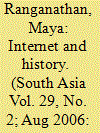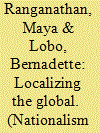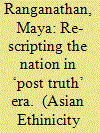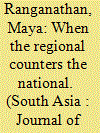| Srl | Item |
| 1 |
ID:
072981


|
|
|
| 2 |
ID:
081352


|
|
|
|
|
| Publication |
2008.
|
| Summary/Abstract |
Multinational corporations (MNCs) and their economies of production and distribution are based on the concept that the world is one market where the boundaries of the nation-states do not intrude in the sale of the products. Typically, MNC's products are most often centrally manufactured and distributed throughout the world with often no difference in the products that are sold in different countries. However, while it is found that the products can ignore the national boundaries, the process of marketing them cannot. This paper explores the process by which MNCs employ nationalist ideologies as a marketing tool through an analysis of television advertisements of MNCs in India. India offers a good case study in view of cultural nationalism that dictates her national identity and the path of economic liberalization that the country launched into 15 years ago
|
|
|
|
|
|
|
|
|
|
|
|
|
|
|
|
| 3 |
ID:
185946


|
|
|
|
|
| Summary/Abstract |
This paper evaluates the ways in which new national narratives are sought to be constructed in ‘post-truth’ era – marked by what Harsin terms competing convictions, discord and confusion and attempts to manage the communication environment. New technologies and online spaces facilitate the ‘re-creation’ and ‘re-construction’ of the past and are co-opted in the nation building project. In the context of extensive studies on how the democratic potential of new technologies is subverted, this paper calls for specific attention to the ways in which (imprecise) history forms part of discursive nationalism in present times. Taking up India as a case study, the paper explores and evaluates the strategies employed in the rescripting of the national narrative potentially leading to new national memory.
|
|
|
|
|
|
|
|
|
|
|
|
|
|
|
|
| 4 |
ID:
131903


|
|
|
|
|
| Publication |
2014.
|
| Summary/Abstract |
The central role that regional-language identities play in the communicative and cultural settings of South Asia is best reflected in the regional media landscape. The varied influences of regional media on a nation's polity and society in multilingual countries like India have largely been evaluated within the framework of the reconstitution of public space. This paper furthers such studies by arguing that the reconstitution of the Indian public by regional media is, in some instances, effected through a discourse that counters the mainstream, or the 'national-nodal point'. At a time when coalition national governments comprise or depend upon the support of regional political parties for survival, a counter-hegemonic regional discourse can have far-reaching effects, extending the regional media's sphere of influence significantly-from national politics to international relations. Through an analysis of the constructions of the Sri Lankan ethnic issue in the English- and Tamil-language press, I draw out the significance of 'counter-hegemonic' representations in the regional media.
|
|
|
|
|
|
|
|
|
|
|
|
|
|
|
|